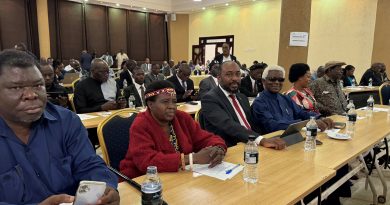Tribal extremism
By Bernard Thungwa
The founding president of Malawi, Dr. Hastings Kamuzu Banda used to call Malawians to unite regardless of their tribal differences. The subsequent presidents have also been preaching the same gospel.
Malawi has a number of tribes including Chewa, Lomwe, Yao, Tumbuka, Ngoni, Sena and Nyanja among others. These tribes have values and beliefs. Some tribes are best known for their language, food, dances, marriage procedures and funeral rituals.
We are, or should we say, we were so fondly known as The Warm Heart of Africa. Foreigners used to enjoy their visits in Malawi. Visitors from within the country were also accorded a very warm welcome. I still remember when our parents could keep an unknown visitor, who had asked for food and shelter, for a couple of days without any problems. We were indeed one Malawi!

Tribal extremism can lead to war
Slowly, things have taken a different direction. Every tribe is now trying to be more prominent than the other. Even in common places, you would literally see people chatting according to tribes, a thing which was not there some time in the past. Some would even engage in speaking their tribal language without caring whether the other person is understanding it or not.
We often hear statements like “we are the original chewas, founders of gule wamkulu”, “we are the real ngonis, strong and fearless” etc. These sentiments have been accelerated by the tribal groupings which have mushroomed in the country under the umbrella of preserving their culture. Some tribes conduct annual festivals to celebrate or make known their lifestyle. Cultural festivities like Mulhakho wa Alhomwe, Mthetho, Kulamba etc, have become the order of the day.
Inter-tribal marriages are also discouraged because one tribe feels superior than the another. At the workplace, if you are not of their tribe, you will not be considered for promotion or even employment. People are favoring one of their tribe regardless of qualification, experience and dedication. Have you ever wondered why many forms for employment or curriculum vitae demand that one should indicate their district of origin and their tribe or religion? This is to say we will employ you if you belong to such a tribe!
No wonder, at some point, Kamuzu Banda forced everyone to work in their own district. He did this after noting that people were favoring their tribal men when offering employment.
Unfortunately, our politics has also fallen in the lines of tribalism. There are some political parties which are perceived to belong to a specific tribe. A ruling party will try its level best to please a particular tribe. Our politicians have successfully managed to divide us according to tribes and regions.
Some tribes have reached the extent of declaring a particular area, district and region as a no-go zone area for other tribes. They are ready to harass anyone who is not of their own. There is a syndrome of “awa ndi obwera”. But what is it in a tribe that can make one fail to relate with another person of a different tribe? ‘There is so much that unites us than divide us.’ Let us relate with all at all times!




22 thoughts on “Tribal extremism”